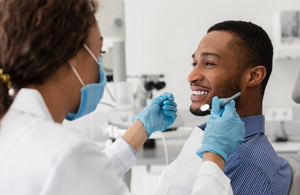
Oral health is often underestimated in its significance, but it plays a pivotal role in our overall well-being. A healthy mouth not only allows us to eat and speak comfortably but also contributes to our self-esteem and quality of life. However, maintaining good oral health isn’t just about daily brushing and flossing; it also involves early detection of oral health problems. In this blog, we will explore why early detection of oral health problems is so crucial.
1. Preventing Pain and Discomfort
One of the primary reasons for early detection is the prevention of pain and discomfort. Dental issues, such as cavities and gum disease, can progress silently until they reach an advanced stage where they cause pain and discomfort. Regular dental check-ups allow dentists to identify problems in their early stages, enabling timely intervention and treatment to prevent unnecessary suffering.
2. Minimizing Treatment Costs
Addressing oral health problems in their early stages is not only better for your well-being but also for your wallet. Dental treatments become more complex and costly as conditions worsen. A minor cavity can be treated with a simple filling, but if left untreated, it may require a more extensive procedure like a root canal or extraction. By catching issues early, you can save yourself from the financial burden of extensive treatments.
3. Preserving Natural Teeth
Our natural teeth are irreplaceable. Early detection and treatment of oral health problems help preserve your natural teeth. Whether it’s addressing tooth decay, gum disease, or a cracked tooth, prompt attention can often prevent the need for extractions or prosthetic solutions like dental implants or dentures.
4. Protecting Overall Health
Oral health is closely linked to overall health. Several studies have shown connections between oral health problems and systemic conditions such as diabetes, heart disease, and respiratory diseases. Early detection and treatment of oral issues can reduce the risk of these complications and contribute to your overall well-being.
5. Boosting Self-Confidence
A healthy smile can do wonders for your self-confidence and social life. Dental problems, especially visible ones like stained or missing teeth, can have a significant impact on your self-esteem. By addressing these issues early, you can maintain a confident and radiant smile.
6. Enhancing Long-Term Oral Health
Early detection not only addresses current problems but also sets the stage for long-term oral health. Regular check-ups allow your dentist to provide guidance on oral hygiene practices, diet, and lifestyle choices that can help you maintain a healthy smile for years to come.
Early detection of oral health problems is a fundamental aspect of maintaining a healthy mouth and overall well-being. It helps prevent pain and discomfort, reduces treatment costs, preserves natural teeth, protects your overall health, boosts self-confidence, and enhances long-term oral health. Therefore, it’s essential to prioritize regular dental check-ups and take action promptly if any oral health concerns arise. Remember, a healthy smile is a priceless asset that deserves your attention and care.
About the Author
Dr. Natalya Ramsay is a passionate dentist dedicated to providing exceptional care in a welcoming environment. With a degree in General Dentistry from Oregon Health and Science University, she continuously updates her skills and offers expertise in various specialties, including pediatric dentistry, surgical treatments, and cosmetic dentistry. Dr. Ramsay is committed to community service, volunteering with Medical Teams International Dental Van and offering scholarships to high school seniors. Her genuine compassion and comprehensive approach make her the ideal choice for your dental needs.
If you have any questions about the performance of preventive care, we can be reached at our website or by phone at (503) 472-1403.
